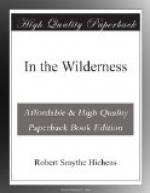We went through it last summer; making our way into the jaws from the foot of the great slides on Dix, keeping along the ragged spurs of the mountain through the virgin forest. The pass is narrow, walled in on each side by precipices of granite, and blocked up with bowlders and fallen trees, and beset with pitfalls in the roads ingeniously covered with fair-seeming moss. When the climber occasionally loses sight of a leg in one of these treacherous holes, and feels a cold sensation in his foot, he learns that he has dipped into the sources of the Boquet, which emerges lower down into falls and rapids, and, recruited by creeping tributaries, goes brawling through the forest basin, and at last comes out an amiable and boat-bearing stream in the valley of Elizabeth Town. From the summit another rivulet trickles away to the south, and finds its way through a frightful tamarack swamp, and through woods scarred by ruthless lumbering, to Mud Pond, a quiet body of water, with a ghastly fringe of dead trees, upon which people of grand intentions and weak vocabulary are trying to fix the name of Elk Lake. The descent of the pass on that side is precipitous and exciting. The way is in the stream itself; and a considerable portion of the distance we swung ourselves down the faces of considerable falls, and tumbled down cascades. The descent, however, was made easy by the fact that it rained, and every footstep was yielding and slippery. Why sane people, often church-members respectably connected, will subject themselves to this sort of treatment,—be wet to the skin, bruised by the rocks, and flung about among the bushes and dead wood until the most necessary part of their apparel hangs in shreds,—is one of the delightful mysteries of these woods. I suspect that every man is at heart a roving animal, and likes, at intervals, to revert to the condition of the bear and the catamount.
There is no trail through Hunter’s Pass, which, as I have intimated, is the least frequented portion of this wilderness. Yet we were surprised to find a well-beaten path a considerable portion of the way and wherever a path is possible. It was not a mere deer’s runway: these are found everywhere in the mountains. It is trodden by other and larger animals, and is, no doubt, the highway of beasts. It bears marks of having been so for a long period, and probably a period long ago. Large animals are not common in these woods now, and you seldom meet anything fiercer than the timid deer and the gentle bear. But in days gone by, Hunter’s Pass was the highway of the whole caravan of animals who were continually going backward; and forwards, in the aimless, roaming way that beasts have, between Mud Pond and the Boquet Basin. I think I can see now the procession of them between the heights of Dix and Nipple Top; the elk and the moose shambling along, cropping the twigs; the heavy bear lounging by with his exploring nose; the frightened deer trembling at every twig that snapped beneath his little hoofs,




